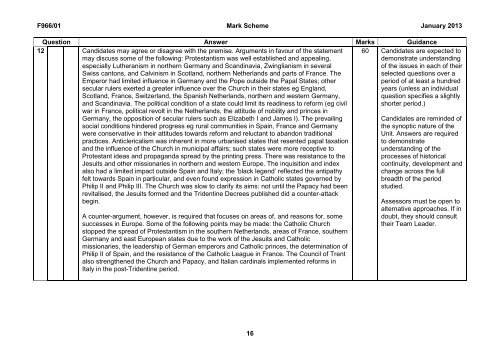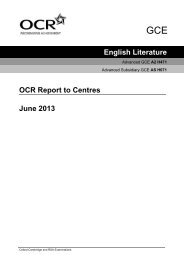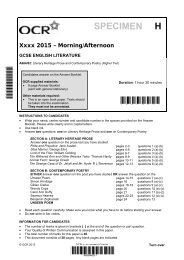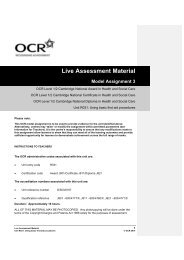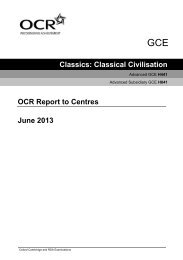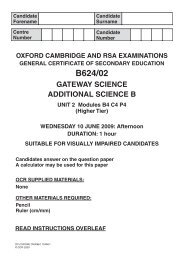Mark scheme - Unit F966/01 - Historical themes - Option A - OCR
Mark scheme - Unit F966/01 - Historical themes - Option A - OCR
Mark scheme - Unit F966/01 - Historical themes - Option A - OCR
You also want an ePaper? Increase the reach of your titles
YUMPU automatically turns print PDFs into web optimized ePapers that Google loves.
<strong>F966</strong>/<strong>01</strong> <strong>Mark</strong> Scheme January 2<strong>01</strong>3<br />
Question Answer <strong>Mark</strong>s Guidance<br />
12 Candidates may agree or disagree with the premise. Arguments in favour of the statement<br />
may discuss some of the following: Protestantism was well established and appealing,<br />
especially Lutheranism in northern Germany and Scandinavia, Zwinglianism in several<br />
Swiss cantons, and Calvinism in Scotland, northern Netherlands and parts of France. The<br />
Emperor had limited influence in Germany and the Pope outside the Papal States; other<br />
secular rulers exerted a greater influence over the Church in their states eg England,<br />
Scotland, France, Switzerland, the Spanish Netherlands, northern and western Germany,<br />
and Scandinavia. The political condition of a state could limit its readiness to reform (eg civil<br />
war in France, political revolt in the Netherlands, the attitude of nobility and princes in<br />
Germany, the opposition of secular rulers such as Elizabeth I and James I). The prevailing<br />
social conditions hindered progress eg rural communities in Spain, France and Germany<br />
were conservative in their attitudes towards reform and reluctant to abandon traditional<br />
practices. Anticlericalism was inherent in more urbanised states that resented papal taxation<br />
and the influence of the Church in municipal affairs; such states were more receptive to<br />
Protestant ideas and propaganda spread by the printing press. There was resistance to the<br />
Jesuits and other missionaries in northern and western Europe. The inquisition and index<br />
also had a limited impact outside Spain and Italy; the ‘black legend’ reflected the antipathy<br />
felt towards Spain in particular, and even found expression in Catholic states governed by<br />
Philip II and Philip III. The Church was slow to clarify its aims: not until the Papacy had been<br />
revitalised, the Jesuits formed and the Tridentine Decrees published did a counter-attack<br />
begin.<br />
A counter-argument, however, is required that focuses on areas of, and reasons for, some<br />
successes in Europe. Some of the following points may be made: the Catholic Church<br />
stopped the spread of Protestantism in the southern Netherlands, areas of France, southern<br />
Germany and east European states due to the work of the Jesuits and Catholic<br />
missionaries, the leadership of German emperors and Catholic princes, the determination of<br />
Philip II of Spain, and the resistance of the Catholic League in France. The Council of Trent<br />
also strengthened the Church and Papacy, and Italian cardinals implemented reforms in<br />
Italy in the post-Tridentine period.<br />
60 Candidates are expected to<br />
demonstrate understanding<br />
of the issues in each of their<br />
selected questions over a<br />
period of at least a hundred<br />
years (unless an individual<br />
question specifies a slightly<br />
shorter period.)<br />
Candidates are reminded of<br />
the synoptic nature of the<br />
<strong>Unit</strong>. Answers are required<br />
to demonstrate<br />
understanding of the<br />
processes of historical<br />
continuity, development and<br />
change across the full<br />
breadth of the period<br />
studied.<br />
Assessors must be open to<br />
alternative approaches. If in<br />
doubt, they should consult<br />
their Team Leader.<br />
16


